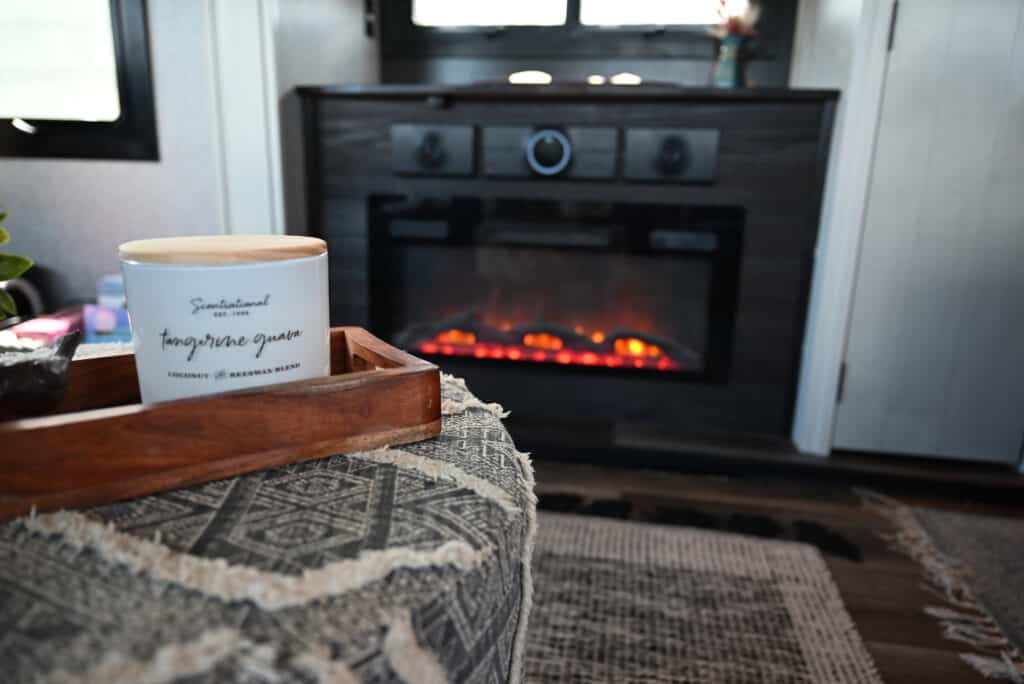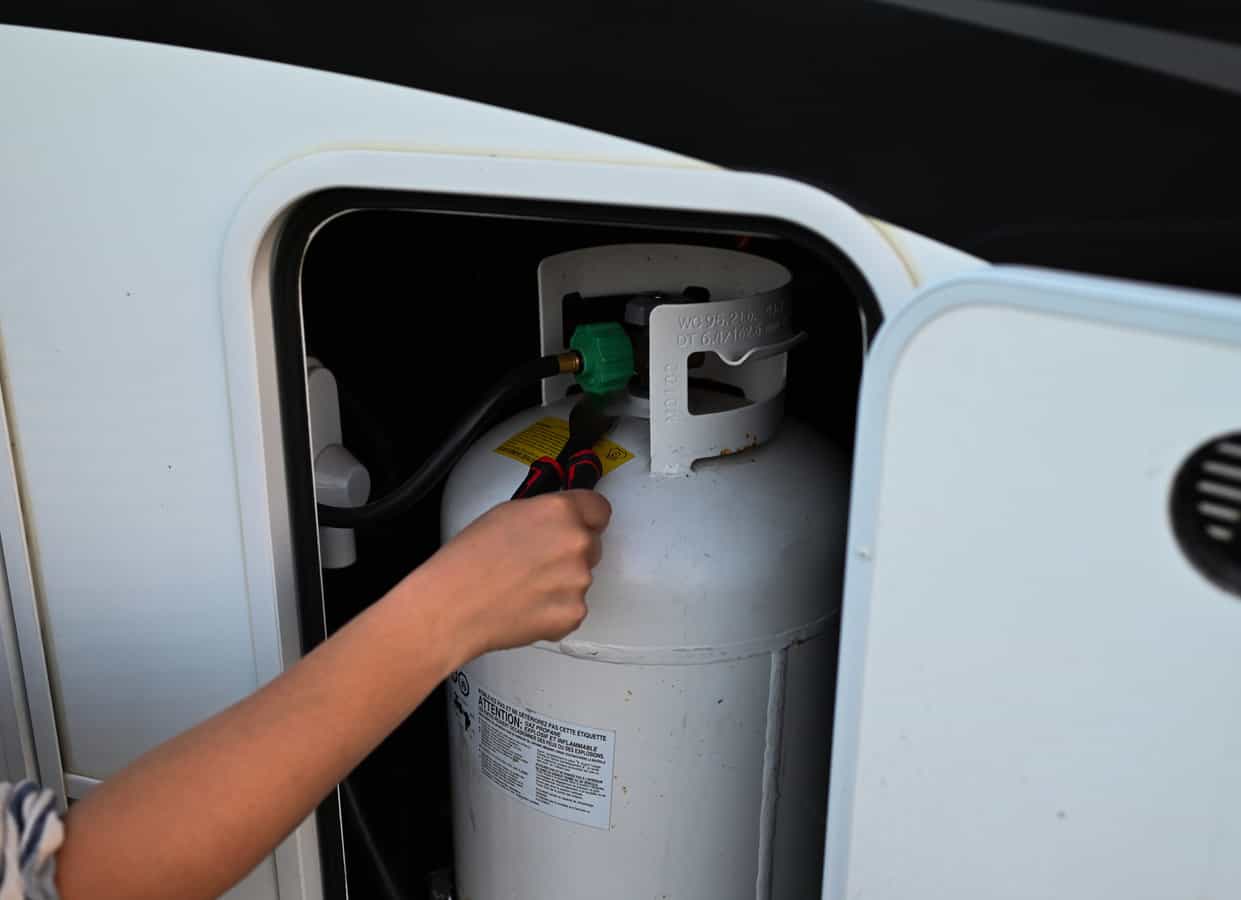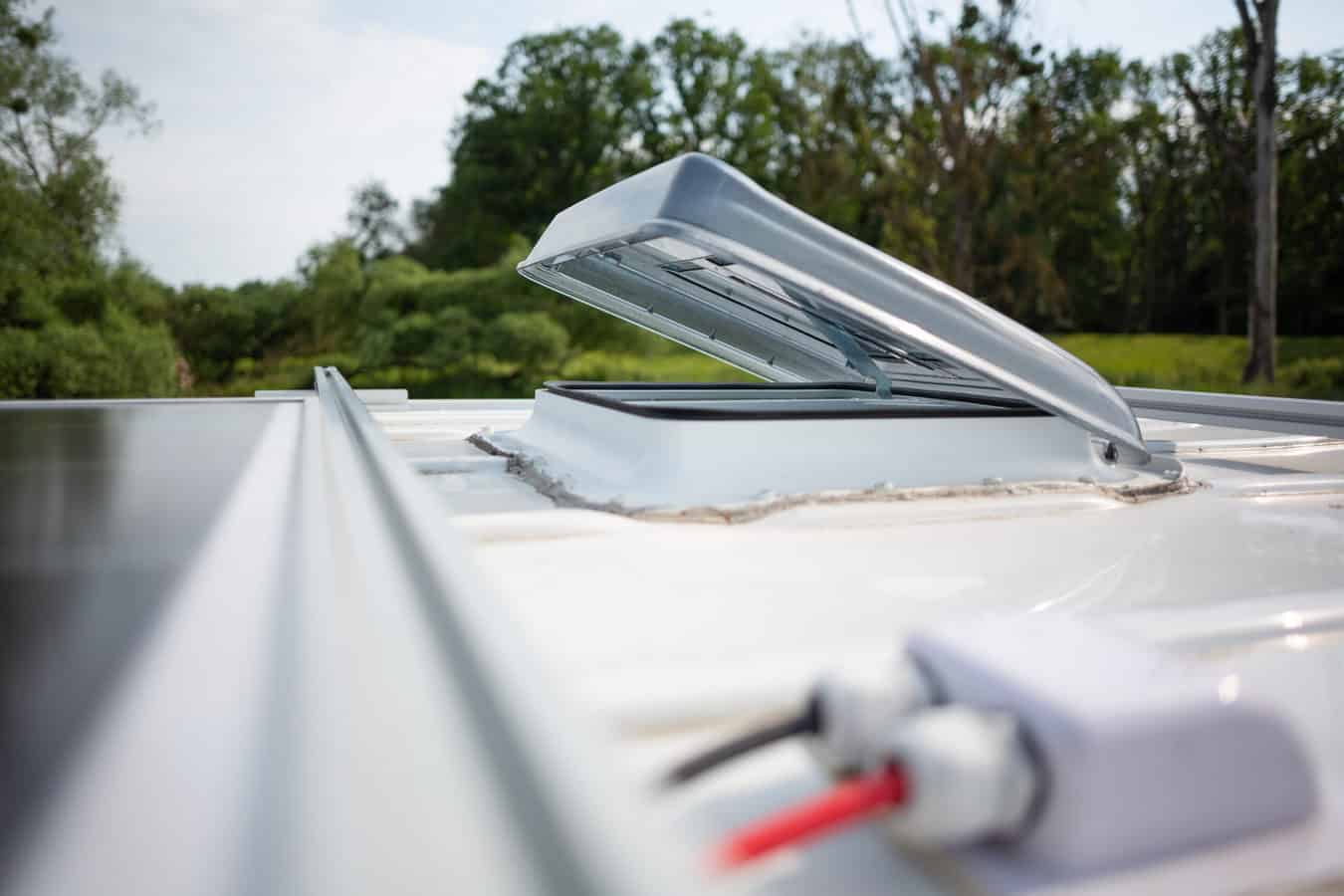
Don’t Choose Cozy over Safety
As we head into the fall and winter months, we all need to stay warm during our camping trips! For many people, this includes turning on their RV fireplaces and cozying up next to the flickering lights. Many modern RVs include electric fireplaces, but some people choose to install wood-burning models instead. Regardless of the type you use, there are some general fireplace safety tips you should follow.
In most cases, RV fireplaces are quite safe. But just like anything else that produces heat, there’s always a chance that a fire could break out. It’s your responsibility to prevent this from happening or be prepared to deal with a fire if it does occur. You can do this by minimizing the fire hazards in your RV and traveling with all the necessary safety equipment.
We all love our fireplaces, so let’s talk about some ways to use them safely. We’ll cover some general tips for operation and maintenance, as well as the differences between wood burning and electric models. Finally, we’ll explore a couple of fireplace alternatives you could try.
RV Fireplace Safety Tips
1. Keep a fire extinguisher on hand
In the ideal scenario, you’ll never have to deal with a fire breaking out in your RV. This is a fairly rare occurrence and it’s not something you need to worry about too much. But it’s still smart to be prepared for the worst, just in case! After all, it’s much better to have an extinguisher and never use it rather than not having one when you desperately need it.
A fire extinguisher is a standard item for fire safety. These enable you to quickly put out a blaze and protect your RV from additional damage. It’s a good idea to have on one hand whether you have a fireplace or not! Fires can break out from propane leaks, nearby campfires, or electrical issues.
Most RVs come with a fire extinguisher because it’s a standard piece of safety equipment. But you may want to buy your own if it’s a secondhand model and you can’t tell how long the canister has been dormant. Speaking of, you should get the extinguisher inspected and tested about once per year. These items can last for a long time, but it never hurts to stay on the safe side!
2. Check your smoke detectors regularly
Smoke detectors are also essential items when it comes to RV fireplace safety. If something starts smoking in your RV, you’ll want to know about it immediately. Fires can spread quickly in such a small living space, so you’ll need as much advance warning as you can get.
Smoke detectors also need to be checked and maintained on a regular basis. Be sure to replace the batteries on schedule and make sure the unit is operational. You may be tempted to remove the batteries if the detector sets off false alarms, but try to avoid this practice. It’s better to deal with a false alarm rather than have a dead smoke detector when there’s an active fire.
3. Remove flammable material in the surrounding area
On their own, most fireplaces are quite harmless. They are designed to create and emit heat in a safe manner. But even though the fireplace itself is protected against excessive heat, your personal belongings don’t come with the same guarantee.
It’s your responsibility to keep flammable items away from your RV fireplace. This might include things like books, curtains, rugs, candles, electronics, blankets, and any items made of wood, paper, and cardboard. Even nonflammable items can be damaged by the heat so be very careful about what you put in the area. As a general guideline, you should try to clear a two-foot radius around your fireplace.
4. Minimize tripping hazards around the fireplace
Your personal safety is another thing to consider. Fireplaces are wonderful for keeping your RV warm and comfortable, but the surface can still get pretty hot. If you fall or accidentally brush the hot surface, you could walk away with a terrible burn. Therefore, you should do whatever you can to minimize tripping hazards around your fireplace. Look out for loose rugs, cords, and stray objects on the ground. It may be a good idea to set up a safety grate around the fireplace as well, just in case you happen to bump into it.
5. Keep children and pets at a distance
As adults, we tend to be pretty good at avoiding risky situations. But children and pets are less aware of their surroundings, so it’s easier for them to get hurt. If you have high-risk passengers like this, you’ll need to be extra careful about using your RV fireplace.
Try to teach children to leave it alone. You may want to place childproof locks over the control panel or keep the remote out of reach. Again, safety grates can be a good way to keep them away from the hottest parts of the fireplace. The same rules apply to pets! Do what you can to teach them that the fireplace is off-limits. You could use training commands or try scented sprays to make them stay away from dangerous areas. Limit roughhousing and indoor running as much as possible to avoid an accident.
6. Look for RV fireplace models with safety features
A lot of RVs come with pre-installed fireplaces, but there may be circumstances where you get to choose the make and model. In this case, you should prioritize fireplaces that come with safety features. One of the most common safety features is an overheating shutoff function. If the temperature rises too high, the fireplace will automatically shut off so it can cool down. Free-standing models may also come with a tip-over shutdown. If they accidentally fall over, they can sense this and turn themselves off.
7. Don’t overload the fireplace outlet
Most RV fireplaces are electric, so they need access to a power outlet. It can take a lot of energy to power these devices, so try to keep the outlet as clear as possible. Overloading the sockets can lead to electrical malfunctions, sparks, and power flickers.
8. Never leave the fireplace unattended
Finally, never leave the fireplace running when you’re not in the room. It may seem completely harmless, but you never know when a part could malfunction or a breeze could blow a piece of paper into the heat. As a precaution, only use the fireplace when you’re there to supervise it. Turn it off if you need to go into another room or step outside for a moment. It’s easy to forget about the RV fireplace if you’re not looking at it! Make these habits now so you can prevent a disaster.
Electric vs. Wood Burning RV Fireplaces
As we said before, most modern RV fireplaces are electric, not gas or wood burning. Electric models are fairly safe and they can integrate smoothly with your floorplan and furniture. Some people prefer the style and function of wood-burning fireplaces though. These are often included in custom builds like skoolies and truck campers. They add a cozy ambiance and a rustic design style. But they’re also more dangerous because of the live fire. You’ll have to deal with complications like stray sparks, ash, and wood smoke.
You should follow all of the tips above, regardless of your fireplace style. But with a wood-burning stove, you’ll also need to be careful about where you store your firewood and how to handle the hot surfaces when you need to refuel.
RV Fireplace Alternatives
If a fireplace sounds like too much work, you could also opt for an alternative heater. Popular options include electric space heaters, propane heaters/camp stoves, or ceramic space heaters. They may not be as powerful or as dangerous as a full-sized fireplace, but you should still follow the same fire safety tips we listed above.
Related Articles:




